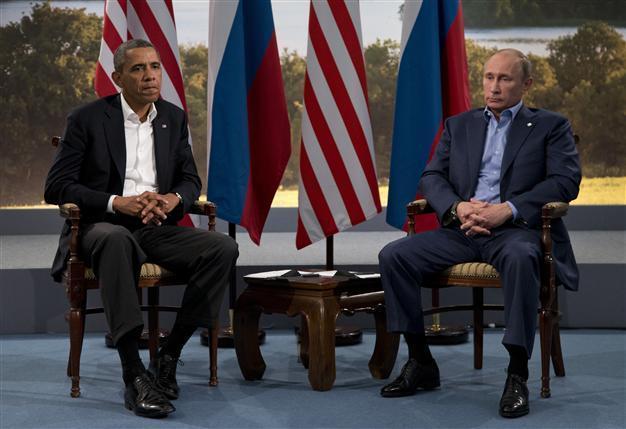Russia, US engage for major move in Syria
WASHINGTON / MOSCOW

AP Photo
As U.S. President Barack Obama and Russian counterpart Vladimir Putin get ready for a key meeting, news pouring in from Washington, Moscow and Damascus suggests a major cooperation to counter jihadists and find a solution in Syria may be the next move.Russia has in recent weeks sent hundreds of troops, as well as fighter jets, artillery and other military hardware to the Latakia region in northwestern Syria, leaving Washington wondering if - or when - Russia will intervene in the four-and-a-half-year civil war on behalf of its ally, Syrian President Bashar al-Assad.
U.S. Secretary of Defense Ashton Carter said Sept. 24 if Russia were to fight Islamic State of Iraq and the Levant (ISIL) jihadists while also pursuing a political solution to the crisis, and not just “indiscriminately” attack foes of al-Assad, Washington and Moscow might find ways to work together.
“On a course like that, it is possible that we could find areas of cooperation,” Carter told reporters. “But if it’s a matter of pouring gasoline on the fire on the civil war in Syria, that is certainly not productive.”
The diplomatic flurry came amid concerns about increased Russian military support to al-Assad, including Moscow’s announcement Sept. 24 that it would hold naval drills in the eastern Mediterranean region in September and October.
Syrian government forces used newly arrived Russian warplanes to bombard ISIL militants in Aleppo province in northern Syria, a group monitoring the civil war said on Sept. 24, in an attempt to break a siege on a nearby air base.
On Sept. 23, the Syrian military deployed Russian-supplied drones for the first time, a security source in Damascus said. The army received new weaponry from Russia for its fight against jihadists, including at least five fighter jets, a senior Syrian military official told AFP.
Moscow could join anti-ISIL coalition
One of the concerns the U.S. has is the spectre of Russian and U.S.-led coalition jets flying in the same air space. The Pentagon has spoken about the need for “deconfliction” to avoid the risk of any incidents.
Moscow could “theoretically” join the U.S.-led coalition fighting ISIL if its conditions were met, Interfax news agency quoted Ilya Rogachev, a director at the Russian Foreign Ministry, as saying on Sept. 24.
Meanwhile, a senior adviser to al-Assad claimed Russia and the U.S. have reached a “tacit agreement” on ending Syria’s bloody crisis. “The current U.S. administration wants to find a solution to the crisis in Syria. There is a tacit agreement between the U.S. and Russia to reach this solution,” Bouthaina Shaaban said in an interview with state television late Sept. 23.
Obama will ask Putin to explain how his country’s military presence in Syria will contribute to the defeat ISIL when the two leaders meet on the afternoon of Sept. 28 during the three-day session of the United Nations General Assembly in New York, White House officials said.
“There’s a lot of talk and now it’s time for clarity and for Russia to come clean and come clear on just exactly how it proposes to be a constructive contributor to what is already an ongoing multi-nation coalition,” said Celeste Wallander, the White House National Security Council’s senior director for Russia.
Russia drafts Security Council statement
In an interview taped with CBS’ “60 Minutes” for broadcast Sept. 27, Putin was asked if his country was “trying to save the al-Assad administration.” Putin responded, “Well, you’re right.” He said any effort to destroy al-Assad’s government “will create a situation which you can witness now in the other countries of the region [...] where all the state institutions are disintegrated.”
The Russian leader added, “There is no other solution to the Syrian crisis than strengthening the effective government structures and rendering them help in fighting terrorism.”
A draft statement that Russia had hoped the U.N. Security Council would approve obtained by The Associated Press, urged countries to fight extremist groups “in coordination with the governments of the affected states.”
Russia’s draft seeks to draw the global community into a united effort to fight extremism but its language can be seen as a reference to Syria’s government, which Moscow supports.
The U.S. and its allies object strongly to any coordination with al-Assad.
When will al-Assad leave?
While the U.S. has called for al-Assad’s ouster for more than four years, Secretary of State John Kerry said last week that “it doesn’t have to be on day one or month one or whatever.”
On Sept. 23, French President François Hollande called for a new Syria peace conference “so that all the countries who want to see peace restored in Syria can contribute.” While Hollande maintained that there could be “no transition without [al-Assad’s] departure,” German Chancellor Angela Merkel said Sept. 24 that the Syrian leader should be involved in the talks.
“Either a transition process without al-Assad, or with al-Assad, is possible,” Turkish President Recep Tayyip Erdoğan said on Sept. 24, as Ankara’s long-running policy of opposing the Syrian leader’s presence in any solution process was debated.
On Sept. 25, Erdoğan slammed those who described his remark as a departure from Turkey’s policy on al-Assad. “My approach to Syria is the same with my term as prime minister,” he said.
















